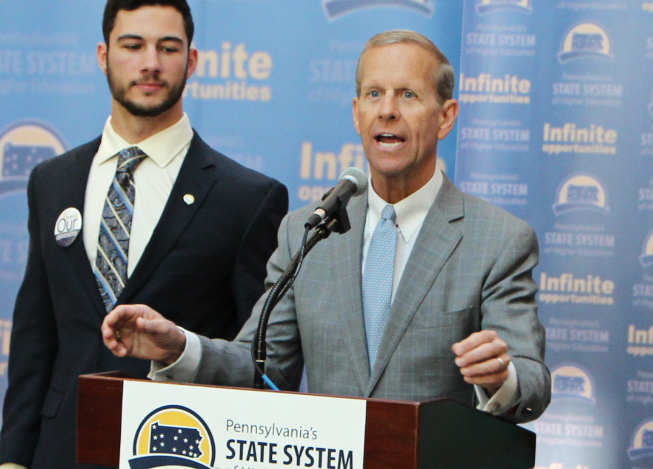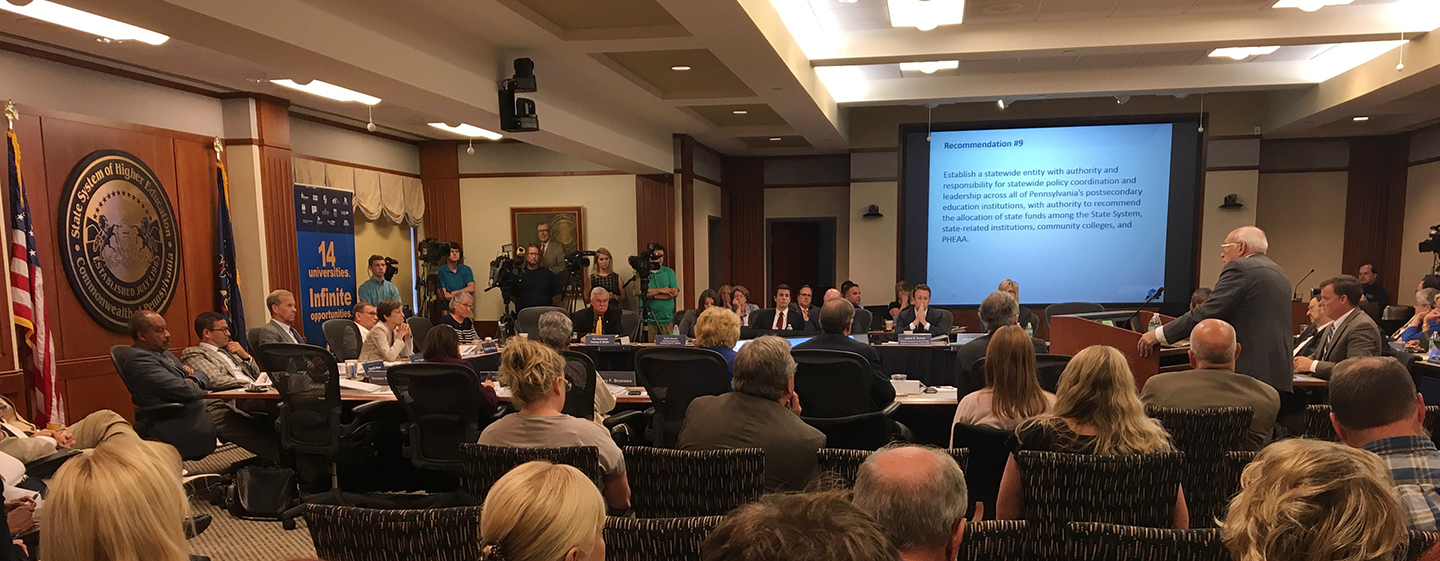Blog
After Chancellor Brogan’s retirement annoucement, APSCUF looks forward to collaboration with State System

Chancellor Frank T. Brogan speaks at Pennsylvania’s State System of Higher Education’s Advocacy Days media event in April at the Pennsylvania Capitol. APSCUF file photo
Chancellor Frank T. Brogan today announced his Sept. 1 retirement from Pennsylvania’s State System of Higher Education. Click here to read the State System’s press release. Click here to read APSCUF’s response.
APSCUF-KU president calls for “equal seat at the table”
APSCUF-KU President Dr. Amanda Morris’ comments as prepared for the July 13, 2017, Board of Governors meeting:
Good morning. My name is Dr. Amanda Morris and I am an associate professor at Kutztown University and I serve as the KU APSCUF chapter president.
Over the past year, I’ve had meetings with some of you, with our own administrators at KU, with legislators and the one thing we have in common is that we all say that we need to collaborate and cooperate more. But we cannot collaborate and cooperate if you shut us out of the decision-making process. So I am here today to request equal representation for faculty on any task force or committee that is created to develop an action plan in response to these consultants’ recommendations.
We expect an equal seat at the table so that faculty can help fix our system. We want to participate in developing solutions with you. And there is precedent for this. I want to draw your attention to two things in the Collective Bargaining Agreement.
First of all, in the beginning of current CBA there are several side letters, many of which establish what are called “joint labor-management committees.” This is all I’m asking for. A joint labor management committee that will figure out how to respond to and incorporate the recommendations the consultants have provided.
Secondly, the “purpose” section of our contract says, “APSCUF and the State System of Higher Education, desiring to cooperate each with the other in mutual respect and harmony” – and I think we can all agree, there hasn’t been a whole lot of harmony in the past year, and there hasn’t been a whole lot of mutual respect.
This is an opportunity, right now, this moment. Show us that you want to work with us. If you want faculty buy-in to whatever it is you think you’re planning to do, you’re going to need faculty to be part of the process. Work with us in mutual respect. Collaborate and cooperate with us in some semblance of harmony.
APSCUF represents the faculty. We are the ones who work most closely with students in the classroom, through advising, even one on one mentorships that extend far beyond their graduation. We want what is best for them.
I want to draw your attention to a line in Article 4 of the CBA. Article 4 is Duties and Responsibilities of Faculty Members and the last line in section B says “faculty members have the responsibility to perform other tasks characteristic of the academic profession, and to attempt honestly and in good conscience to preserve and defend the goals of the Universities including the right to advocate change.”
Members of the Board, chairwoman Shapira, Chancellor, we as faculty have a duty and a responsibility to be involved right now with this issue, with this report. And the Board of Governors and the State System have a duty and a responsibility to include us as equal partners at the decision-making table. Bring us in. Let us help you decide the best course of action in response to the NCHEMS report and maybe, just maybe, we might achieve some harmony and mutual respect.
Read Dr. Kenneth M. Mash’s remarks to the Board of Governors – July 13, 2017
APSCUF President Dr. Kenneth M. Mash’s comments as prepared:
Chairwoman Shapira, Governors, and Chancellor Brogan,
We, like many others in this room and in the Commonwealth, anxiously awaited the NCHEMS presentation that was delivered yesterday, and we are looking forward to greater detail in the upcoming report next Friday. We are still processing all that was in that presentation, but when it comes down to the suggestion that we all need to pull together, we are certainly willing to pick up an oar and do our part.
With that in mind, we would like to suggest that we meet at the negotiations table prior to the expiration of our existing contract to see what we may do with respect to one of NCHEMS’ specific recommendations. That is, I give my commitment to you right now to approach the APSCUF leadership to suggest that we immediately try to work on an early and phased retirement proposal that I hope can lead to a side letter. I believe there are things that can be done within the existing law. I hope that the System leadership will join us in this effort so that we can model the new cooperative spirit that Mr. Jones talked about yesterday. I hope, too, that cooperation will carry over to our general negotiations.
With that aside, I believe that the aspect of the report that most stood out yesterday was Mr. Jones’ comment that there was no “silver bullet.” I strongly disagree. One cannot look at the numbers, the 2012 Maguire report, and the recent reports by the Pennsylvania Budget and Policy Center and not be struck by the fact that Pennsylvania ranks 46th in the nation in per-student funding of public higher education.
With all due respect to the comments yesterday, a 3.5 percent increase in tuition and corresponding fees — plus whatever increases are passed on campus — does make a difference to the lives of working families. It is not an increase in isolation: It is an increase that builds on consecutive increases. It is an increase that must be understood in the context of increased room-and-board fees.
The simple fact is that when the president of a respected private university can get on the radio and say that it is cheaper to attend that university than it is to attend the nearby State System university, there is a real problem.
We have hit the point where every attempt to save money actually winds up hurting our universities and our students. I agree with Gov. Muller 100 percent. We cannot balance the books off the back of System employees. And we certainly cannot balance the books off the backs of our students and our families.
Our Commonwealth — not our universities — are at a crossroads. Too many still have an anachronistic perspective on what it means to pay for college. They imagine that it is still akin to 1995. It is not even close. As I have said here before, total college costs have skyrocketed.
It is not acceptable that students should have to make the awful choice to indebt themselves for a decade or two, or choose between food and books, or choose to abandon the American Dream completely because they cannot afford the cost.
I wish some of you could experience what my colleagues experience or what our SCUPA colleagues experience when they must look into the eyes of students who say that they just cannot afford to attend college any longer.
It is equally unacceptable to shut down academic opportunities for students and services for students and try to sell them on the idea that this will continue to provide a quality education.
There is, in fact, a “silver bullet.” That lies in adequately making the very real case to all of the Commonwealth’s policymakers that the situation is intolerable. We, like everyone else, do appreciate the increase in a difficult budget year. But it will be a difficult budget year for tens of thousands of students and their families that will have to pay for college this fall.
Our policymakers must come up with solutions that provide relief for Pennsylvania’s working class. The future of every citizen of the Commonwealth is at risk until they do.
To our students and to families out there I will say this: Despite some of the rhetoric you may hear, the faculty and coaches at your universities have given of their time, money, and energy in pursuit of additional funding.
Our intent is to double down to fight for you to make college more affordable. I certainly hope that everyone involved in this System can make that commitment.
I was actually wrong. It’s not a silver bullet. It’s just the right thing to do.
Thank you for your time.
After NCHEMS presentation, APSCUF awaits details
 Dennis Jones, president emeritus of National Center for Higher Education Management Systems, presents initial findings of NCHEMS’ review of Pennsylvania’s State System of Higher Education at the Wednesday, July 12, Board of Governor’s meeting. Photo/Kathryn Morton
Dennis Jones, president emeritus of National Center for Higher Education Management Systems, presents initial findings of NCHEMS’ review of Pennsylvania’s State System of Higher Education at the Wednesday, July 12, Board of Governor’s meeting. Photo/Kathryn Morton
Consultants for Pennsylvania’s state-owned universities today presented their initial findings from a systemwide review. Click here to read APSCUF’s response.
APSCUF life: Engagement counts in and out of class
Last summer, APSCUF went behind the scenes to show how faculty members and coaches continue to devote themselves to affordable, quality education even when class is not in session. This post is a continuation of that series.
 After working as a certified public accountant, I got into teaching 17 years ago. In nearly two decades, I’ve learned that education doesn’t begin at the start of class — nor does it end when students leave the room. I continue to facilitate learning during my office hours, extracurricular activities, and whenever I advise students.
After working as a certified public accountant, I got into teaching 17 years ago. In nearly two decades, I’ve learned that education doesn’t begin at the start of class — nor does it end when students leave the room. I continue to facilitate learning during my office hours, extracurricular activities, and whenever I advise students.
I use my experiences as an accountant to help students understand how things really work in business. Passing the CPA exam was one of my greatest professional accomplishments to date, and I share both insights about the professional work of CPAs and what it takes to pass the CPA exam with my students.
One way our students at Lock Haven University are gaining awareness about the work of CPAs and CPA candidates (individuals working toward passing the exam) is through our student-run CPA Prep Club. During our meetings, local CPAs discuss their work, and we conduct mini mock CPA exams. As the faculty mentor for this club, I have seen how this time spent with students outside of class has allowed students to connect with each other more, with other CPAs, and with me.
We live in a global economy, so it is rewarding to see that a number of students at Lock Haven University take advantage of study-abroad programs. To encourage more interactions with students in other countries, I partnered one of my upper-level accounting students with former students from my term as a guest lecturer in Germany. These interactions and insights proved to be valuable for all students involved in this pilot assignment.
Students today expect more from faculty than ever before, in part, due to use of technology. I welcome students to reach out to me over the weekend with questions or concerns that cannot wait to be addressed until the regular workweek. In addition, on some Sunday afternoons, I offer help sessions for the introductory-level classes, and many students take advantage of this informal way to interact with me and to learn the material more thoroughly.
I also feel compelled to accept some students’ requests to redo exams under certain circumstances and/or take an incomplete over the summer so that they can successfully complete some missed assignments. Their success in learning and applying the course material is important.
Regan Garey is an associate professor at Lock Haven University.